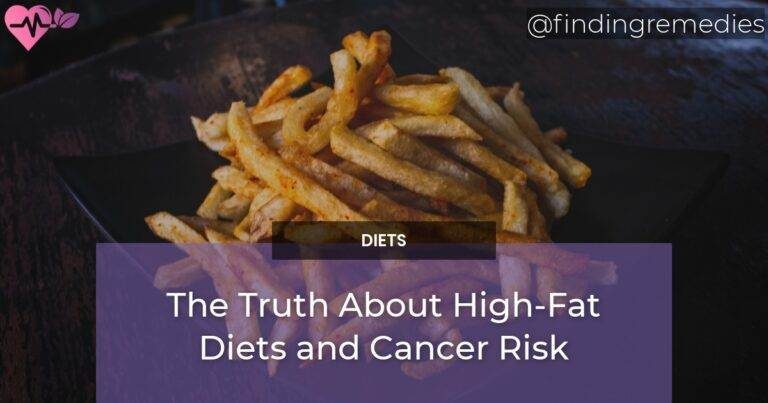Are you looking to lose weight and live a healthier lifestyle, but you’re worried about consuming too much fat? You may have heard contradicting reports about the link between high-fat diets and cancer risk. Some have cited it as a risk factor, others ignore the connection altogether. In our latest article, we’ll cut through the confusion and set you on the right path to a healthier you. We’ll start by exploring the scientific studies that have looked into the relationship between fat and cancer. We’ll uncover hidden facts, previously unknown truths, and lessons to help you make well-informed decisions about the types of food you put into your body. From there, we’ll move onto tips and advice on reducing your fat intake, while still maintaining a balanced diet filled with the nutrition you need.
The article, “The Truth About High-Fat Diets and Cancer Risk,” is the perfect resource for anyone looking to make healthier diet choices without sacrificing the foods they love. Keep reading to learn the real facts about fat intake and cancer risk; don’t miss out on a chance to live your best and healthiest life!
Role of dietary fat in cancer
Dietary fat is an essential nutrient that provides energy and supports various cellular functions in the body. However, it has been linked to the development of cancer. According to research, high-fat diets can promote the growth and spread of cancer cells by altering the body’s hormone levels, immune function, and metabolism.
Table of Contents
Types of dietary fats and their impact
There are different types of dietary fats, including saturated fats, unsaturated fats, and omega-3 fatty acids. Saturated fats are mostly found in animal products and have been associated with increasing cancer risk. On the other hand, unsaturated fats, mainly found in plant-based foods, offer anti-inflammatory properties and have been linked to reduced cancer risk. Omega-3 fatty acids, found in fatty fish and some nuts and seeds, have also been associated with reduced cancer risk.
Correlation between high-fat diets and cancer risk
Several studies have shown a correlation between high-fat diets and increased cancer risk. According to the American Cancer Society, a diet high in red and processed meats, fried foods, and full-fat dairy products can increase the risk of various cancers, including breast, colon, liver, pancreatic, and prostate cancer.
Mechanisms behind high-fat diets and cancer risk
High-fat diets can increase cancer risk through various mechanisms, including promoting inflammation, oxidative stress, and tumor growth. They can also increase the levels of insulin and insulin-like growth factor-1, which can stimulate cancer cell growth. Additionally, high-fat diets can alter lipid metabolism and cause insulin resistance and obesity, which are also risk factors for cancer.
ALSO READ
Research on high-fat diets and cancer
Recent research has shown that a high-fat diet can increase the risk of cancer by promoting the growth and spread of cancer cells. However, some studies have conflicting findings and limitations that make it difficult to draw definitive conclusions.
Conflicting findings on high-fat diets and cancer
The conflicting findings on the relationship between high-fat diets and cancer could be due to various factors, including the type and amount of dietary fat consumed, the study population, and other lifestyle factors that affect cancer risk. It is essential to consider these factors when interpreting research findings.
Importance of moderation in dietary fat consumption
Moderation is key when it comes to consuming dietary fats. It is recommended to consume a diet that includes healthy fats such as those found in nuts, seeds, avocados, and fatty fish while limiting the intake of saturated and trans fats. According to the American Cancer Society, a healthy diet should consist of at least five servings of fruits and vegetables a day, whole grains, and lean proteins.
Other lifestyle factors that affect cancer risk
Apart from dietary fat consumption, other lifestyle factors that affect cancer risk include physical activity, smoking, alcohol consumption, and exposure to carcinogens or cancer-causing agents. It is essential to adopt a healthy lifestyle that includes regular exercise, avoiding smoking and excessive alcohol consumption, and reducing exposure to environmental toxins to reduce cancer risk.
Importance of individualized dietary recommendations
Individualized dietary recommendations are essential as everyone’s nutritional needs differ based on age, sex, physical activity level, and health status. It is essential to consult a registered dietitian or healthcare provider to determine an appropriate dietary fat intake that aligns with individual needs and preferences.
Practical tips for reducing dietary fat intake
Reducing dietary fat intake can be challenging, but it is achievable with some practical tips such as:
- Opting for lean protein sources such as skinless chicken and turkey, fish, and legumes
- Choosing low-fat or non-fat dairy products
- Using healthy oils such as olive, avocado, and coconut oil for cooking
- Reducing the intake of processed and fried foods
- Choosing healthy snacks such as nuts, seeds, and fruits
Conclusion
In conclusion, the link between high-fat diets and cancer risk is a complex issue that requires careful consideration. While some studies have shown a correlation, other studies have conflicting findings. It is essential to adopt a healthy lifestyle that includes a balanced diet, regular exercise, and avoidance of unhealthy habits such as smoking to reduce cancer risk. Remember, moderation is key when it comes to dietary fat consumption, and it is essential to consult a healthcare provider or registered dietitian for individualized dietary recommendations.
RELATED ARTICLES:

